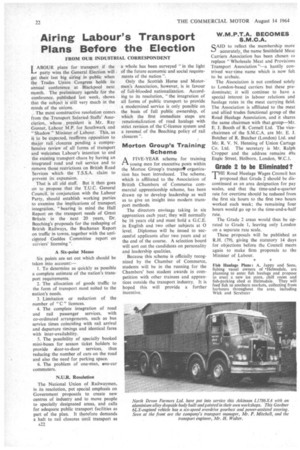Airing Labour's Transport Plans Before the Election
Page 24

If you've noticed an error in this article please click here to report it so we can fix it.
FROM OUR INDUSTRIAL CORRESPONDENT
LABOUR plans for transport if the 1.-i party wins the General Election will get their last big airing in public when the Trades Union Congress holds its annual conference at Blackpool next month. The preliminary agenda for the conference, published last week, shows that the subject is still very much in the minds of the unions.
The most constructive resolution comes from the Transport Salaried Staffs' Association, whose president is Mr. Ray Gunter, Labour M.P. for Southwark and Shadow" Minister of Labour. This, as is to be expected, reaffirms opposition to major rail closures pending a comprehensive review of all forms of transport and welcomes Labour's intention to end the existing transport chaos by having an integrated road and rail service and to remove those restrictions on British Road Services which the T.S.S.A. claim to prevent its expansion.
That is all old stuff. But it then goes on to propose that the T.U.C. General Council. in conjunction with the Labour Party, should establish working parties to examine the implications of transport integration, "bearing in mind the Hall Report on the transport needs of Great Britain in the next 20 years, Dr. Beeching's proposals for the reshaping of British Railways, the Buchanan Report on traffic in towns, together with the anticipated Geddes Committee report on carriers' licensing ".
A Six-point Memo Six points are set out which should be taken into account:— 1. To determine as quickly as 'possible a complete estimate of the nation's transport requirements.
2. The allocation of goods traffic to the form of transport most suited to the nation's needs.
3. Limitation or reduction of the number of "C " licences.
4. The complete integration of road and rail passenger services, with co-ordinated arrangements, such as bus service times coinciding with rail arrival and departure timings and identical fares with inter-availability.
5. The possibility of specially booked mini-buses for season ticket holders to provide door-to-door services, thus reducing the number of cars on the road and also the need for parking space.
6. The problem of one-man, one-car commuters.
N.U.R. Resolution The National Union of Railwaymen, in its resolution, put special emphasis on Government proposals to create new centres of industry and to move people to specially designated areas, and calls for adequate public transport facilities as part of the plan. It therefore demands a halt to rail closures until transport as A22 a whole has been surveyed "in the light of the future economic and social requirements of the nation ".
Only the Scottish Horse and Motormen's Association, however, is in favour of full-blooded nationalization. According to its resolution, "the integration of all forms of public transport to provide a modernized service is only possible on the basis of full public ownership, of which the first immediate steps are renationalization of road haulage with strict revision of the C-licence system and a reversal of the Beeching policy of rail closures ".
Morton Group's Training Scheme AFIVE-YEAR scheme for training young men for executive posts within the Morton Group's transpoil organization has been introduced. The scheme, which is affiliated to the Association of British Chambers of Commerce commercial apprenticeship scheme, has been drawn up to develop leadership as well as to give an insight into modern transport methods.
The directors envisage taking in six apprentices each year; they will normally be 16 years old and must hold a G.C.E. in English and two other subjects at 0 level. Diplomas will be issued to successful applicants after two years and at the end of the course. A selection board will sort out the candidates on personality and leadership qualities.
Because this scheme is officially recognized by the Chamber of Commerce, students will be in the running for the Chambers' best student awards in competition with other trainees and apprentices outside the transport industry. It is hoped this will provide a further incentive.
W.M.P.T.A. BECOMES S.M.C.A.
SAID to reflect the membership more accurately, the name Smithfield Meat Carriers Association has been chosen to replace "Wholesale Meat and Provisions Transport Association "—a hastily contrived war-time name which is now felt to be archaic.
The Association is not confined solely to London-based carriers but these predominate; it will continue to have a special interest in labour relations and haulage rates in the meat carrying field. The Association is affiliated to the meat and allied trades functional group of the Road Haulage Association, and it shares the same chairman with that,group—Mr. E. J. Booth of R. Cornell Ltd. The vicechairmen of the S.M.C.A, are Mr. E. J. Butcher of R. Butcher (London) Ltd. and Mr. R. V. N. Henning of Union Cartage Co. Ltd. The secretary is Mr. Ralph Cropper and the address remains 49a Eagle Street, Holborn, London, W.C.1.
Grade 2 to be Eliminated?
THE Road Haulage Wages Council has proposed that Grade 2 should be discontinued as an area designation for pay scales, and that the time-and-a-quarter rate for overtime should be reduced from the first six hours to the first two hours worked each week; the remaining four hours would go up to the time-and-a-half rate.
The Grade 2 areas would thus be uprated to Grade 1, leaving only London on a separate rate scale.
These proposals will be published as R.H. (79), giving the statutory 14 days for objections before the Council meets again to make firm proposals to the Minister of Labour.
Fish Haulage Plans : A. Jappy and Sons, fishing vessel owners of •Helmsdale, are planning to enter fish haulage and propose to erect a new ice store, chill room and fish-packing shed at Helmsdale. They will feed fish to southern markets, collecting from harbours throughout the area, including Wick and Scrabster




















































































































